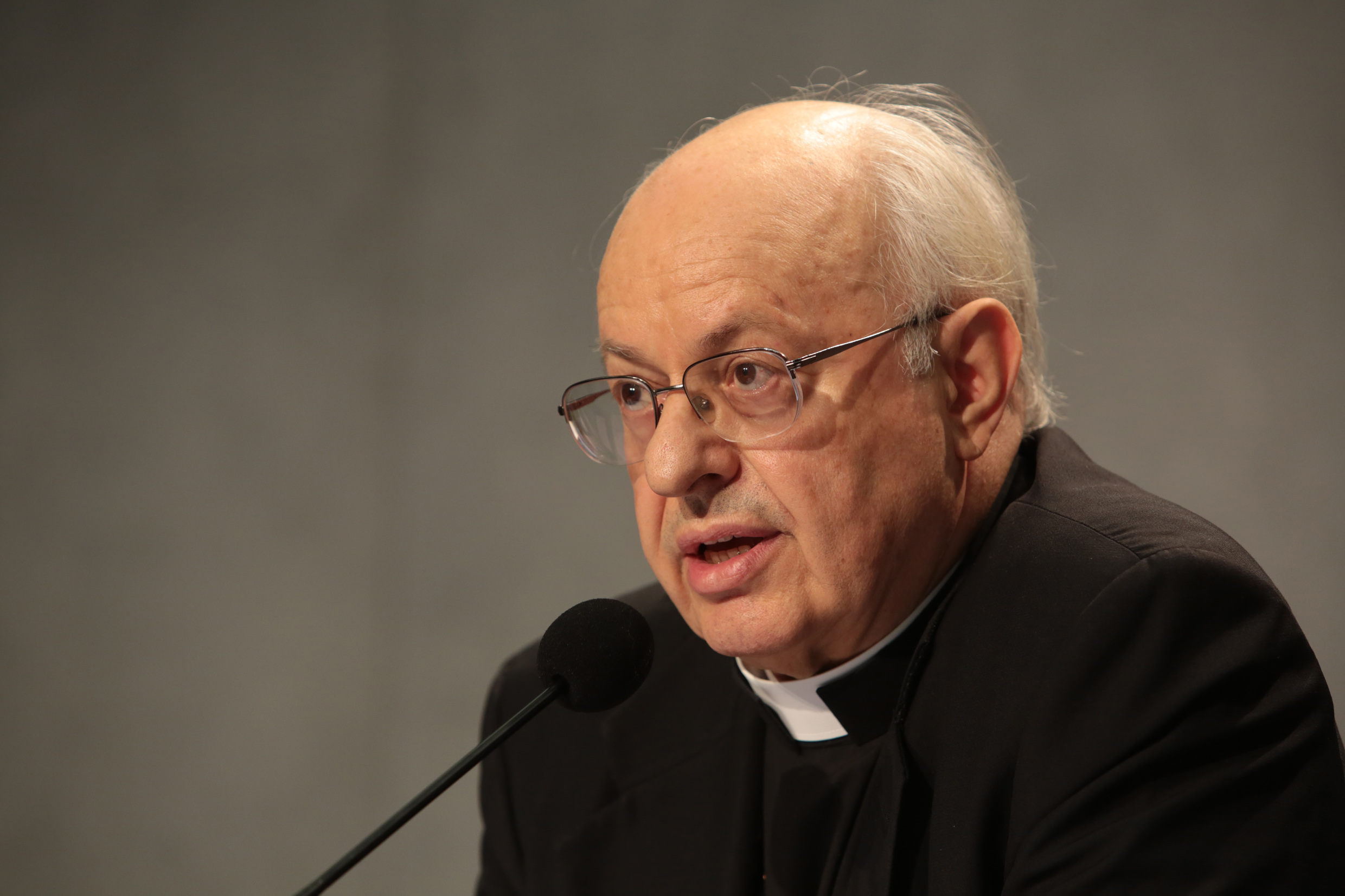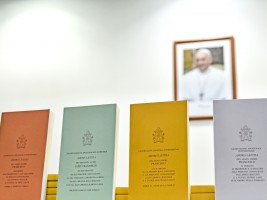Balance and future prospects
Extensive interview with the Secretary General of the Synod of Bishops one month after the publication of “Amoris lætitia”. “The document was received positively throughout the world. On future prospects: it will be necessary to reflect “on how to concretize the experience of a synodal Church.”

“It’s an important date for the Church and for this Pontificate.” Cardinal Lorenzo Baldisseri, Secretary General of the Bishops’ Synod, has no doubts on the historical bearing of past April 8, a date that marked the publication of the post-Synodal Apostolic Exhortation Amoris lætitia. We met him a month later to take stock of the document’s reception and to reflect on the future prospects for the “progress of Synodality.”
Your Eminence, to a certain extent, it can be said that the publication of the Apostolic Exhortation Amoris lætitia has sealed the synodal process of the past two years. What is the balance of this process? Given your particular “observatory”, could you provide an overview of the response to Amoris lætitia worldwide?
 The publication of the Apostolic Exhortation Amoris lætitia is the point of arrival of a long, truly synodal process that began in September 2013, which brought together all ecclesial components on the theme of the family in the Church and in society. The balance of this process is widely viewed as a positive one. We witnessed the authentic development of a process for reflection on the family and consecrated life, whereby everyone has voiced their thoughts, concerns, views, according to individual roles and responsibilities.
The publication of the Apostolic Exhortation Amoris lætitia is the point of arrival of a long, truly synodal process that began in September 2013, which brought together all ecclesial components on the theme of the family in the Church and in society. The balance of this process is widely viewed as a positive one. We witnessed the authentic development of a process for reflection on the family and consecrated life, whereby everyone has voiced their thoughts, concerns, views, according to individual roles and responsibilities.
With the Apostolic Exhortation the Pope testifies to an attentive listening of the reflections of the people of God and of the two assemblies of the Synod, thus expressing his eminent words.
To my knowledge, and as it emerged in the recent meeting of the Council Secretariat, the document’s reception was generally very positive. In most cases was highlighted the Pope’s ability to understand and be close to the many experiences of individuals and families, the concreteness of the language, the constant emphasis on the beauty and richness of the family, the call to seize the positive aspects of different situations. Many people have appreciated the feeling of inclusion expressed by the Pope. I remember, for example, some widowed persons who shared their deep emotion in finding their experience of life in the Exhortation, along with the gratitude that grieving families wanted to express to the Holy Father, for they felt his words and his own person accompanying their pain.
How has the document been received in the various Countries?
While some general remarks can be made on the reception of the Exhortation, it would be premature to provide details on its reception at national level.
It will take some time to establish the reception of the document, which, by all accounts, is extremely articulate, addressing various themes.
We will learn more about the reception and implementation of the Exhortation through the concrete experience of dioceses, parishes, and ecclesial communities.
The theme of synodality and collegiality are very dear to Pope Francis. In his speech at the ceremony for the 50th anniversary of the institution of the Synod of Bishops he said, inter alia, “it is precisely this path of synodality which God expects of the Church of the third millennium.” Will this path become concrete? How?
The reflection on synodality is present in the life of the Church since the Second Vatican Council. The institution of the Synod of Bishops in 1967 was its first result. Thus Pope Francis has undertaken a path that had been created long before. He invites us to continue along this path, in the belief that, as Saint John Chrysostom says,
“Church and Synod are synonyms”.
It will be necessary to reflect and deepen the various aspects involved, in order to indentify the most appropriate way to concretize the experience of a “synodal Church.”
Why is it so hard to understand that the dynamics of synodality don’t respond to the logic of contrapositions or of “win-lose” factions?
We have been excessively used to reasoning in majority-minority terms, expressing the winners and the losers. This inevitably causes contrapositions.
On the contrary, synodality responds to a different criteria, namely, consensus is aimed at reaching the ultimate goal “salus animarum”, that is modulated in time and space on concrete themes, whence spring the decisions for the good of the faithful.
From this perspective everyone’s contribution is important, as it contributes to expanding mutual and external knowledge, to clarifying difficulties, proposing opinions that presuppose the need for further clarifications. The final goal is not to reach compromise solutions in order to have more votes and win, but rather to agree on a solution viewed as the best possible option for everyone’s good. It is necessary to jointly develop all those aspects which concur to the most righteous conclusion, so as to reach a convergence that best expresses everyone’s points of view. Even when each item is voted in order to reach a majority on a given text, it’s always important to bear in mind common criteria and shared positions.
How can the act of listening and communion be promoted for a synodal Church?
A synodal Church is based on the interaction of three subjects, each of which has a specific role and responsibility:
The People of God as a whole, the bishops, and the Pope.
Their interaction highlights and strengthens mutual communion. Thus it is necessary that this communion be equally visible in the concrete life of ecclesial communities and in decision-making circumstances alike. This already occurs – or should occur – in various places: Parish Councils, Presbyterial Councils, pastoral Councils, not to mention diocesan Synods, which are recovering a significant role within local churches. The way of conducting the past two Synod assemblies on the family has brought to the fore yet another element that promotes listening and communion on necessary decisions, namely, the consultation of all the people of God – individuals, families, priests, consecrated men and women, groups, organizations, academic environments.
The Ordinary Council of the General Secretariat of the Synod convened a few days ago. During the meeting participants identified some of the themes for the next Assembly. Could you tell us more about this?
After the presentation of the proposed themes by Bishops’ Conferences and other Council members, the Council identified two possible themes.
The first focuses on Church organization and life at internal level, including priestly ministry and related formation; interreligious dialogue as promoter of peace; synodality inside the Church.
The second thematic area mostly regards the relationship between Church and contemporary society, its problems and expectations. From this perspective special relevance was given to various topics, such as the pastoral care of the young, migration, the social doctrine of the Church.
Obviously, the distinction between “internal” and “external” issues regards general aspects, that is, when the Church looks at herself she serves the purpose of offering a better service to all human society, and when she addresses her attention to society she does so to find the best ways to proclaim the Gospel. As provided for in the regulation of the Synod, the themes have been presented to the Holy Father, who will decide herein.
A reform of the Synod of Bishops is being considered. At what stage is it?
We are currently working on this project. The first step has been made with a Seminar held in February, attended by some fifty experts and University professors. The lectures, presentations, and ensuing debates were particularly enriching and provided interesting food for thought. The Ordinary Council of the General Secretariat has dedicated a long session to in-depth analysis of the themes highlighted during the Seminar. We are working towards a revision of the Ordo Synodi Episcoporum, to include the experience of the procedures characterising the past two Synodal Assemblies as well as the contributions and reflections that emerged during the Seminar and the related in-depth analysis by the Ordinary Council of the General Secretariat.
What are the next steps of this process?
We look forward to continue the process of ecclesial participation of the whole people of God and use the existing instruments, strengthening them and enriching them with greater doctrinal clarity and adequate pastoral action.
The synodal experience of the past three years of institutional activity of the Synod of Bishops encourages us to continue along this path in order to reach concrete goals. Emerging issues challenge the Church and represent occasions for great awareness marked by universal, involving and stimulating participation. Pope Francis teaches us to look ahead with courage and determination, to cross walls and borders heading towards vast horizons, new areas for evangelization.